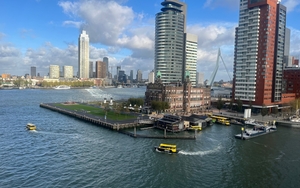IN truth, there were one or two among the throng in the theatre foyer who were overheard murmuring that they were a tad apprehensive about this lauded “discourse on distress” by Tennessee Williams; fearful perhaps that his admittedly angst-strewn text might lead them into a tedious darkness where three hours of intense drama might become a suffocating blanket.
You could have heard the wind whispering through the estuary reeds of Lake Pontchartrain during the first act which, at one hour and 40 minutes, says much for the engrossing performances all around
Their unease was quelled within minutes of this startlingly mesmeric ‘Streetcar’ that drew in the audience like the ghostly, and fateful, sing-song pleas to mariners by the ancient Sirens of the deep; a rather apt if opaque simile for the flaky character of Blanche DuBois, a woman apparently serene and gilded with a rich vein of snootiness, yet wrought with frailties and anxiety, and whose past was soon to unravel her present.
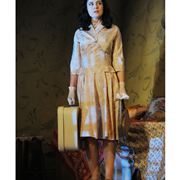
Director Gemma Bodinetz will surely be beaming at her choice of Amanda Drew to tackle the role which, in times past, has engaged, among other remarkable performers, Vivien Leigh in both a stage and film version, and Susannah York in a rare stage appearance at the Bolton Octagon some 20-odd years ago.
Whatever the magnetic presence that those earlier gifted actresses might have imbued to the part, Amanda Drew slipped in to Blanche’s tortured, fragile ‘frock of many colours’ personality as though it was designed just for her; shifting and shaping the deceptions and self-deceits that kept the once wealthy southern belle just ahead of the mental shredding machine - at least for a while.
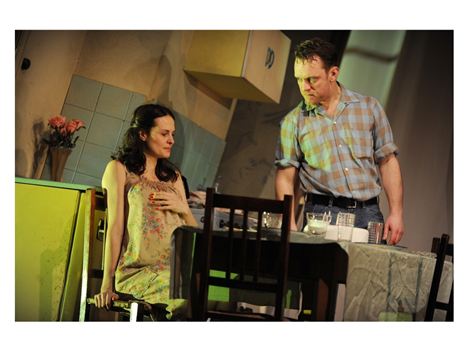 Vivien Leigh had a brooding, manic Marlon Brando as the rack upon which she would be sundered; Drew had as passionate a foil in Sam Troughton as the loutish, abrasive vulgarian Stanley Kowalski, the ‘All American Boy’ married to her younger sister Stella - a seemingly more pragmatic individual than Blanche who is inclined to mourn to distraction the loss of both a young husband and their former elegant Old South lifestyle in a French colonial manse known as Belle Reve, both memories fondly elevated beyond the reality.
Vivien Leigh had a brooding, manic Marlon Brando as the rack upon which she would be sundered; Drew had as passionate a foil in Sam Troughton as the loutish, abrasive vulgarian Stanley Kowalski, the ‘All American Boy’ married to her younger sister Stella - a seemingly more pragmatic individual than Blanche who is inclined to mourn to distraction the loss of both a young husband and their former elegant Old South lifestyle in a French colonial manse known as Belle Reve, both memories fondly elevated beyond the reality.
The social conflicts between the sisters’ one time privileged existence and where they now reside in the more basic accommodations of the poor French Quarter of New Orleans - a kaleidoscope of cultures and customs, and nationalities - becomes the anvil upon which Blanche is hammered into submission and eventual breakdown.
The clash between Blanche and Stanley is marvellously expressed by Drew and Troughton in a forceful and dynamic fusing of the ying and yang of opposites grating against each other. The resultant scratchy verbal exchanges are similar to that of an involuntary shuddering wince when subjected to the piercing squeak from the rubber soul of a lazy trainer scuffed on polished floors. Indeed, this can also apply to elements of the punchy and at times searing dialogue.
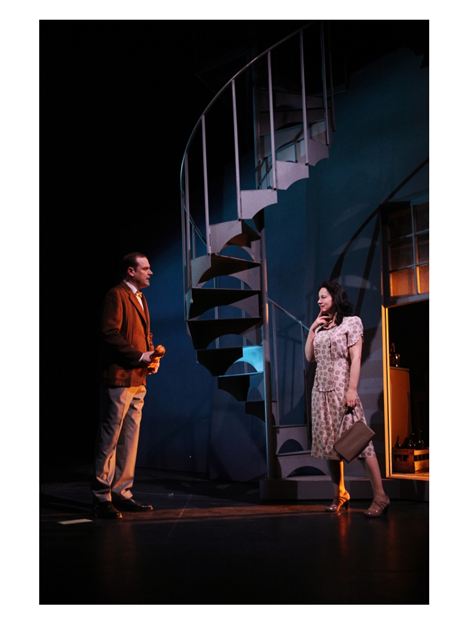 Drew captures and embraces this psychological decline with a subtle force that is entrancing and equally disturbing, allowing Blanche’s despair and disgust at the fall in fortunes of her family to light the fuse beneath Stanley’s own insecurities.
Drew captures and embraces this psychological decline with a subtle force that is entrancing and equally disturbing, allowing Blanche’s despair and disgust at the fall in fortunes of her family to light the fuse beneath Stanley’s own insecurities.
There are few male writers that can peer into the minds and souls of women and explore and exploit the complexities with any dexterity. Perhaps only Liverpool’s own Willy Russell is an equal of Williams in this respect, although in the American playwright’s case his male characters are frequently one dimensional: bullies, thugs and Neanderthals, as Blanche so neatly describes.
Thus the blokes in ‘Streetcar’ are never rounded, like the women. Even Stella – a sympathetic and emotive interpretation by Leanne Best – has more depth to her than macho man Stanley who rants and raves as though possessed by a warrior Viking; in some ways a mirror to the slow disintegration of Blanche but never as sophisticated in the dynamics of dread and alarm.
The play is largely executed in Stella and Stanley’s Spartan apartment – a gold star here to designer Gideon Davey and lighting person Paul Keogan as the set is an essential ingredient of the narrative yet is never distracting – around which Amanda Drew flutters, sparring and sporting with Stanley, and his pal Mitch. The latter has designs on Blanche, and she on him, for ulterior pecuniary reasons, until he is advised by Stanley of her allegedly one-time flighty and flirtatious ways.
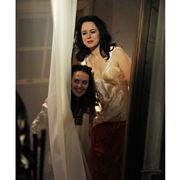 There is a chemistry that sparks and sparkles between Drew, Troughton and Matthew Flynn as Mitch, as well as a fine understanding and interaction with Leanne Best.
There is a chemistry that sparks and sparkles between Drew, Troughton and Matthew Flynn as Mitch, as well as a fine understanding and interaction with Leanne Best.
An indication of this production’s potency is that you could have heard the wind whispering through the estuary reeds of Lake Pontchartrain during the first act which, considering it spans one hour and 40 minutes, says much for the engrossing performances all around. Even the daunted from the foyer, earlier, sat absorbed, barely able to breathe with the tension.
As the play drew to its distraught and disquieting conclusion some Playhouse audience members admitted they themselves were drained by the emotional chaos that had unfolded. And, as the cast took a deservedly huge applause and encore, it was clear that they, too, were exhausted by the sheer energy of their commitment. Enthralling stuff.
8/10














